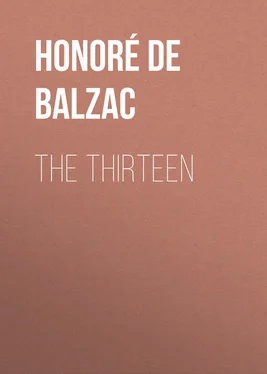Honoré Balzac - The Thirteen
Здесь есть возможность читать онлайн «Honoré Balzac - The Thirteen» — ознакомительный отрывок электронной книги совершенно бесплатно, а после прочтения отрывка купить полную версию. В некоторых случаях можно слушать аудио, скачать через торрент в формате fb2 и присутствует краткое содержание. Жанр: literature_19, foreign_antique, foreign_prose, на английском языке. Описание произведения, (предисловие) а так же отзывы посетителей доступны на портале библиотеки ЛибКат.
- Название:The Thirteen
- Автор:
- Жанр:
- Год:неизвестен
- ISBN:нет данных
- Рейтинг книги:3 / 5. Голосов: 1
-
Избранное:Добавить в избранное
- Отзывы:
-
Ваша оценка:
- 60
- 1
- 2
- 3
- 4
- 5
The Thirteen: краткое содержание, описание и аннотация
Предлагаем к чтению аннотацию, описание, краткое содержание или предисловие (зависит от того, что написал сам автор книги «The Thirteen»). Если вы не нашли необходимую информацию о книге — напишите в комментариях, мы постараемся отыскать её.
The Thirteen — читать онлайн ознакомительный отрывок
Ниже представлен текст книги, разбитый по страницам. Система сохранения места последней прочитанной страницы, позволяет с удобством читать онлайн бесплатно книгу «The Thirteen», без необходимости каждый раз заново искать на чём Вы остановились. Поставьте закладку, и сможете в любой момент перейти на страницу, на которой закончили чтение.
Интервал:
Закладка:
She was a grisette of Paris; a grisette in all her glory; a grisette in a hackney-coach, – happy, young, handsome, fresh, but a grisette; a grisette with claws, scissors, impudent as a Spanish woman, snarling as a prudish English woman proclaiming her conjugal rights, coquettish as a great lady, though more frank, and ready for everything; a perfect lionne in her way; issuing from the little apartment of which she had dreamed so often, with its red-calico curtains, its Utrecht velvet furniture, its tea-table, the cabinet of china with painted designs, the sofa, the little moquette carpet, the alabaster clock and candlesticks (under glass cases), the yellow bedroom, the eider-down quilt, – in short, all the domestic joys of a grisette’s life; and in addition, the woman-of-all-work (a former grisette herself, now the owner of a moustache), theatre-parties, unlimited bonbons, silk dresses, bonnets to spoil, – in fact, all the felicities coveted by the grisette heart except a carriage, which only enters her imagination as a marshal’s baton into the dreams of a soldier. Yes, this grisette had all these things in return for a true affection, or in spite of a true affection, as some others obtain it for an hour a day, – a sort of tax carelessly paid under the claws of an old man.
The young woman who now entered the presence of Monsieur and Madame Jules had a pair of feet so little covered by her shoes that only a slim black line was visible between the carpet and her white stockings. This peculiar foot-gear, which Parisian caricaturists have well-rendered, is a special attribute of the grisette of Paris; but she is even more distinctive to the eyes of an observer by the care with which her garments are made to adhere to her form, which they clearly define. On this occasion she was trigly dressed in a green gown, with a white chemisette, which allowed the beauty of her bust to be seen; her shawl, of Ternaux cashmere, had fallen from her shoulders, and was held by its two corners, which were twisted round her wrists. She had a delicate face, rosy cheeks, a white skin, sparkling gray eyes, a round, very promising forehead, hair carefully smoothed beneath her little bonnet, and heavy curls upon her neck.
“My name is Ida,” she said, “and if that’s Madame Jules to whom I have the advantage of speaking, I’ve come to tell her all I have in my heart against her. It is very wrong, when a woman is set up and in her furniture, as you are here, to come and take from a poor girl a man with whom I’m as good as married, morally, and who did talk of making it right by marrying me before the municipality. There’s plenty of handsome young men in the world – ain’t there, monsieur? – to take your fancy, without going after a man of middle age, who makes my happiness. Yah! I haven’t got a fine hotel like this, but I’ve got my love, I have. I hate handsome men and money; I’m all heart, and – ”
Madame Jules turned to her husband.
“You will allow me, monsieur, to hear no more of all this,” she said, retreating to her bedroom.
“If the lady lives with you, I’ve made a mess of it; but I can’t help that,” resumed Ida. “Why does she come after Monsieur Ferragus every day?”
“You are mistaken, mademoiselle,” said Jules, stupefied; “my wife is incapable – ”
“Ha! so you’re married, you two,” said the grisette showing some surprise. “Then it’s very wrong, monsieur, – isn’t it? – for a woman who has the happiness of being married in legal marriage to have relations with a man like Henri – ”
“Henri! who is Henri?” said Jules, taking Ida by the arm and pulling her into an adjoining room that his wife might hear no more.
“Why, Monsieur Ferragus.”
“But he is dead,” said Jules.
“Nonsense; I went to Franconi’s with him last night, and he brought me home – as he ought. Besides, your wife can tell you about him; didn’t she go there this very afternoon at three o’clock? I know she did, for I waited in the street, and saw her, – all because that good-natured fellow, Monsieur Justin, whom you know perhaps, – a little old man with jewelry who wears corsets, – told me that Madame Jules was my rival. That name, monsieur, sounds mighty like a feigned one; but if it is yours, excuse me. But this I say, if Madame Jules was a court duchess, Henri is rich enough to satisfy all her fancies, and it is my business to protect my property; I’ve a right to, for I love him, that I do. He is my first inclination; my happiness and all my future fate depends on it. I fear nothing, monsieur; I am honest; I never lied, or stole the property of any living soul, no matter who. If an empress was my rival, I’d go straight to her, empress as she was; because all pretty women are equals, monsieur – ”
“Enough! enough!” said Jules. “Where do you live?”
“Rue de la Corderie-du-Temple, number 14, monsieur, – Ida Gruget, corset-maker, at your service, – for we make lots of corsets for men.”
“Where does the man whom you call Ferragus live?”
“Monsieur,” she said, pursing up her lips, “in the first place, he’s not a man; he is a rich monsieur, much richer, perhaps, than you are. But why do you ask me his address when your wife knows it? He told me not to give it. Am I obliged to answer you? I’m not, thank God, in a confessional or a police-court; I’m responsible only to myself.”
“If I were to offer you ten thousand francs to tell me where Monsieur Ferragus lives, how then?”
“Ha! n, o, no , my little friend, and that ends the matter,” she said, emphasizing this singular reply with a popular gesture. “There’s no sum in the world could make me tell you. I have the honor to bid you good-day. How do I get out of here?”
Jules, horror-struck, allowed her to go without further notice. The whole world seemed to crumble beneath his feet, and above him the heavens were falling with a crash.
“Monsieur is served,” said his valet.
The valet and the footman waited in the dining-room a quarter of an hour without seeing master or mistress.
“Madame will not dine to-day,” said the waiting-maid, coming in.
“What’s the matter, Josephine?” asked the valet.
“I don’t know,” she answered. “Madame is crying, and is going to bed. Monsieur has no doubt got some love-affair on hand, and it has been discovered at a very bad time. I wouldn’t answer for madame’s life. Men are so clumsy; they’ll make you scenes without any precaution.”
“That’s not so,” said the valet, in a low voice. “On the contrary, madame is the one who – you understand? What times does monsieur have to go after pleasures, he, who hasn’t slept out of madame’s room for five years, who goes to his study at ten and never leaves it till breakfast, at twelve. His life is all known, it is regular; whereas madame goes out nearly every day at three o’clock, Heaven knows where.”
“And monsieur too,” said the maid, taking her mistress’s part.
“Yes, but he goes straight to the Bourse. I told him three times that dinner was ready,” continued the valet, after a pause. “You might as well talk to a post.”
Monsieur Jules entered the dining-room.
“Where is madame?” he said.
“Madame is going to bed; her head aches,” replied the maid, assuming an air of importance.
Monsieur Jules then said to the footmen composedly: “You can take away; I shall go and sit with madame.”
He went to his wife’s room and found her weeping, but endeavoring to smother her sobs with her handkerchief.
“Why do you weep?” said Jules; “you need expect no violence and no reproaches from me. Why should I avenge myself? If you have not been faithful to my love, it is that you were never worthy of it.”
Читать дальшеИнтервал:
Закладка:
Похожие книги на «The Thirteen»
Представляем Вашему вниманию похожие книги на «The Thirteen» списком для выбора. Мы отобрали схожую по названию и смыслу литературу в надежде предоставить читателям больше вариантов отыскать новые, интересные, ещё непрочитанные произведения.
Обсуждение, отзывы о книге «The Thirteen» и просто собственные мнения читателей. Оставьте ваши комментарии, напишите, что Вы думаете о произведении, его смысле или главных героях. Укажите что конкретно понравилось, а что нет, и почему Вы так считаете.












